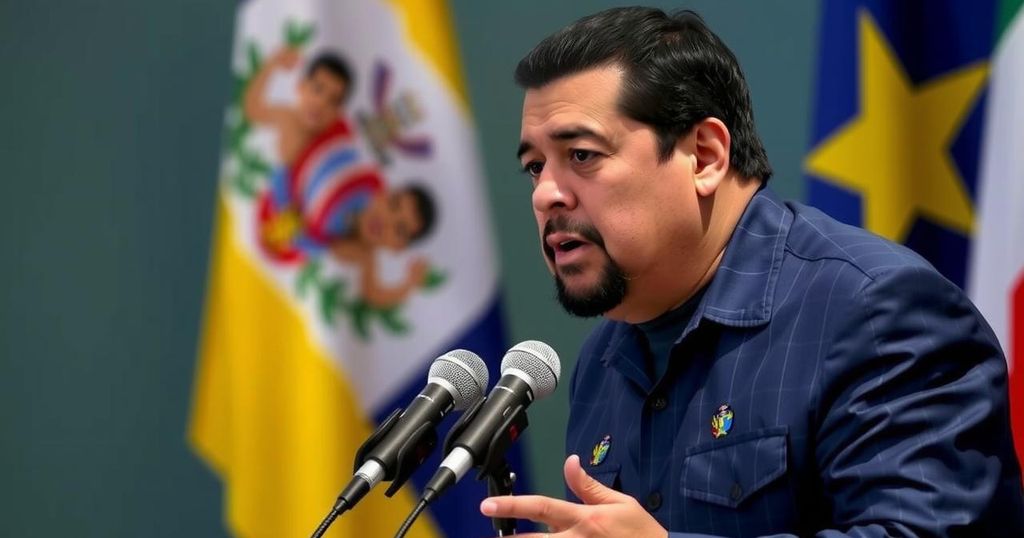Maduro Asserts Venezuela’s Resolve After Brazil’s BRICS Membership Rejection
Venezuelan President Nicolas Maduro vowed that his country would not be silenced following Brazil’s veto of its BRICS membership application, amidst an ongoing economic crisis attributed to US sanctions. Maduro criticized Brazil’s decision as hostile and asserted that he would maintain Venezuela’s voice internationally. Tensions linger between Maduro and Brasilia, particularly following disputed election results that the opposition claims would indicate his defeat. BRICS has recently expanded, now encompassing several additional nations, further complicating Venezuela’s aspirations for inclusion.
On Saturday, October 26, 2024, President Nicolas Maduro of Venezuela expressed his unwavering determination to ensure that his nation remains heard in the global arena, following Brazil’s veto of Venezuela’s application to join the BRICS group of emerging economies. Amidst a profound economic crisis, which the Venezuelan government attributes to sanctions imposed by the United States, the desire to join BRICS has been a longstanding goal for the nation. Venezuela’s discontent towards Brazil’s rejection was palpable, described as a “hostile” and “immoral” action at a recent summit held in Kazan, Russia. Upon returning from the summit, President Maduro asserted in a state television broadcast, “no one will block or silence Venezuela, not today, not tomorrow, not ever.” Despite acknowledging mutual historical ties with Brazilian President Luiz Inacio Lula da Silva, the diplomatic relationship has soured in light of the contentious elections, which Maduro claims to have won, while the opposition in Venezuela argues differently. Former Foreign Minister Celso Amorim, an advisor to President Lula, indicated that the veto stemmed from a perceived “breach of confidence” by Maduro, who allegedly failed to release comprehensive results from the disputed July 28 elections. The Venezuelan opposition contends that these results would highlight Maduro’s defeat by opponent Edmundo Gonzalez Urrutia, who has since relocated to Spain following the issuance of an arrest warrant against him. In his defense, President Maduro stated that he engaged with representatives from “nearly 30 governments” in Kazan, all of whom purportedly acknowledged his “great electoral victory.” BRICS, initially comprised of Brazil, Russia, India, China, and South Africa, expanded in 2024, welcoming Ethiopia, Iran, Egypt, and the United Arab Emirates as new members.
The geopolitical landscape surrounding Venezuela’s economy is complex and fraught with challenges. Struggling under extreme economic distress, the Venezuelan government has consistently pointed to external factors, particularly the sanctions imposed by the United States, as primary contributors to its woes. The government has long pursued membership in BRICS, seeking to leverage the economic collaboration among these emerging economies. However, Brazil’s recent veto illustrates the difficulties Venezuela faces in gaining international recognition amid accusations of electoral impropriety and strained diplomatic relations, particularly after its controversial presidential elections.
In light of the recent developments regarding Venezuela’s bid to join BRICS and Brazil’s decisive veto, President Nicolas Maduro’s remarks underscore his commitment to asserting Venezuela’s position on the international stage. The backdrop of Venezuela’s economic crisis and the contentious political climate exacerbates the challenges faced by Maduro’s regime, highlighting the tenuous nature of international alliances in the wake of electoral disputes. As BRICS expands, the implications for Venezuela’s foreign policy objectives remain uncertain.
Original Source: www.thehindu.com




Post Comment